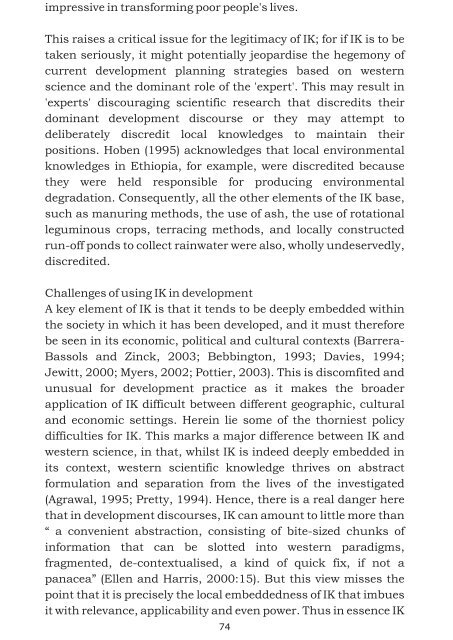Beneficiaries are actors too.pdf - Southern Institute of Peace ...
Beneficiaries are actors too.pdf - Southern Institute of Peace ...
Beneficiaries are actors too.pdf - Southern Institute of Peace ...
You also want an ePaper? Increase the reach of your titles
YUMPU automatically turns print PDFs into web optimized ePapers that Google loves.
impressive in transforming poor people's lives.<br />
This raises a critical issue for the legitimacy <strong>of</strong> IK; for if IK is to be<br />
taken seriously, it might potentially jeopardise the hegemony <strong>of</strong><br />
current development planning strategies based on western<br />
science and the dominant role <strong>of</strong> the 'expert'. This may result in<br />
'experts' discouraging scientific research that discredits their<br />
dominant development discourse or they may attempt to<br />
deliberately discredit local knowledges to maintain their<br />
positions. Hoben (1995) acknowledges that local environmental<br />
knowledges in Ethiopia, for example, were discredited because<br />
they were held responsible for producing environmental<br />
degradation. Consequently, all the other elements <strong>of</strong> the IK base,<br />
such as manuring methods, the use <strong>of</strong> ash, the use <strong>of</strong> rotational<br />
leguminous crops, terracing methods, and locally constructed<br />
run-<strong>of</strong>f ponds to collect rainwater were also, wholly undeservedly,<br />
discredited.<br />
Challenges <strong>of</strong> using IK in development<br />
A key element <strong>of</strong> IK is that it tends to be deeply embedded within<br />
the society in which it has been developed, and it must therefore<br />
be seen in its economic, political and cultural contexts (Barrera-<br />
Bassols and Zinck, 2003; Bebbington, 1993; Davies, 1994;<br />
Jewitt, 2000; Myers, 2002; Pottier, 2003). This is discomfited and<br />
unusual for development practice as it makes the broader<br />
application <strong>of</strong> IK difficult between different geographic, cultural<br />
and economic settings. Herein lie some <strong>of</strong> the thorniest policy<br />
difficulties for IK. This marks a major difference between IK and<br />
western science, in that, whilst IK is indeed deeply embedded in<br />
its context, western scientific knowledge thrives on abstract<br />
formulation and separation from the lives <strong>of</strong> the investigated<br />
(Agrawal, 1995; Pretty, 1994). Hence, there is a real danger here<br />
that in development discourses, IK can amount to little more than<br />
“ a convenient abstraction, consisting <strong>of</strong> bite-sized chunks <strong>of</strong><br />
information that can be slotted into western paradigms,<br />
fragmented, de-contextualised, a kind <strong>of</strong> quick fix, if not a<br />
panacea” (Ellen and Harris, 2000:15). But this view misses the<br />
point that it is precisely the local embeddedness <strong>of</strong> IK that imbues<br />
it with relevance, applicability and even power. Thus in essence IK<br />
74


